The Manchurian Candidate (1962)
Directed by: John Frankenheimer
Written by: George Axelrod, Richard Condon
Starring: Angela Lansbury, Frank Sinatra, Janet Leigh, Laurence Harvey
USA
AVAILABLE ON DUAL FORMAT BLU-RAY AND DVD: Now, from ARROW ACADEMY
RUNNING TIME: 126 min
REVIEWED BY: Dr Lenera, Official HCF Critic
During the Korean War, members of a U.S. platoon are kidnapped and taken to Manchuria in Communist China. Some days later, all but two of the soldiers return to U.S. lines and Staff Sergeant Raymond Shaw is credited with saving their lives in combat. Upon the recommendation of the platoon’s commander, Captain Bennett Marco, Raymond is awarded the Medal of Honour for his reported heroism. Marco begins to suffer from a recurring nightmare in which a hypnotized Raymond kills another soldier before the assembled military brass of Communist nations, during a practical demonstration of a revolutionary brainwashing technique. It seems that Raymond is being prepared as some kind of assassin….
This riveting political thriller foreshadows the wave of similar movies that came in the 70’s but bests them all with its audaciousness, edge and sheer entertainment value. The Manchurian Candidate is a great example of a film which is intelligent and thought provoking but is also a lot of fun. Ahead of its time in quite a few ways, right down to being the first film to cast a black actor [Joe Adams] in a part that wasn’t specified as a black character, it’s one of those great movies that still seems fresh and timely. Many great movies, through no fault of their own, come across as rather dated, but that’s not really the case with The Manchurian Candidate. In fact, it still seems a bit ahead of its time. Maybe that’s partly because, while most political films betray the political leanings of people involved with their making [it seems to be usually ‘left’ these days], this one just seems to both satirise nobody [well, except the notorious Senator Joseph McCarthy who claimed communists were everywhere in the 1950’s] and everybody involved with the dirty, unscrupulous world of politics.
The Manchurian Candidate was part of a four picture deal between United Artists and Frank Sinatra’s production company with Sinatra intended to appear in two of them. George Axelrod’s script followed Richard Condon’s novel quite closely. For the role of Mrs. Iselin, Sinatra had considered Lucille Ball, but director John Frankenheimer convinced him that Angela Lansbury was better, despite being only three years older than Laurence Harvey who plays her son. Filming began each day after 11 A.M. at the request of Sinatra who couldn’t get to sleep before 5 in the morning, while most of his scenes are first takes because Sinatra considered himself at his best then, including one scene where he’s out of focus because Sinatra just wasn’t very good the second time round, a scene praised for showing Marco from Raymond’s distorted point of view. Sinatra also broke his hand during the fight scene and it caused him chronic discomfort for the rest of his life. It was rumoured that after its first run the film was withdrawn from distribution because of the Kennedy assassination, but it was actually because the film flopped. It was largely unseen until 1987 when a cinema re-release caused it to be re-evaluated. It was remade in 2004, and surprisingly Jonathan Demme’s version is actually pretty good too, cleverly reflecting some more modern concerns.
The Manchurian Candidate sure gets going very quickly, though there’s some awkward narration in a few places near the beginning which, despite sounding like it’s coming from a news reader, doesn’t quite work. The film soon recovers though so it’s no big deal, presenting its tangled storyline with clarity and a steady pace that keeps things moving while allowing us to enjoy its often sharp and witty dialogue. It soon becomes apparent that Raymond has been turned into a robotic killer, and the first time I saw this film I wondered if this was being revealed too early, until I realised that Frankenheimer, in a film which is obviously influenced by Alfred Hitchcock’s The Man who Knew Too Much during its climax, was going for, as Hitchcock often said he like to do, suspense over surprise, and anyway there are twists and turns later along with one shocking revelation which certainly stunned me the first time I saw the picture. The slightly fantastical stuff about control via playing cards and weird dreams plays alongside political satire which is very believable indeed. There are two senators out to destroy each other, one of them [who by the way looks like Nixon] being seemingly controlled by his wife who just constantly plies him with booze. This woman, by the way, is not only also Raymond’s mother, and an truly evil cow who ruined her son’s romance with the daughter of the rival senator, but harbours incestuous designs on him judging by a kiss on the lips after which we fade out. The novel was more frank about this aspect, but 1962 audiences would have been shocked anyhow and it’s still exceedingly uncomfortable.
The film steadily builds up to a pulsating climax, delivering surprises and often downright oddness throughout. Marco’s dream is a brilliant piece of surreal, yet understated, weirdness with the kidnapped soldiers being fooled into believing they are in the waiting room of a hotel and present at a meeting of a women’s garden club. There’s a brilliant 360 degree camera pan around the room which eventually reveals pictures of Stalin and Mao Tse-Tung on the wall and Communist heads of state present, after which Raymond strangles another soldier in a disturbingly casual fashion. We cleverly see the rest of the dream from the view point of another soldier having the same dream. Then there’s an early martial arts brawl between Marco and a Korean [though, in perhaps the only major dated ingredient in the film, he’s played by an American, not that such things bother me, and anyway it’s Henry Silva, one of the best bad guy actors ever] which is extremely realistic [well, there were no stuntmen] and vicious, though I have a feeling it inspired the comical Clouseau/ Kato battles in the Pink Panther films. Then there’s that strange meeting between Marco and Eugenie, a jarringly strange conversation between people who have just met and which seems to imply that Eugenie may be working for the Communists. This isn’t followed through, but when the two meet again she tells him that she’s broken off her relationship with her fiancée, for a guy she hardly knows! People behave oddly throughout this film, but this just adds to its disorientating effect, something enhanced by Frankenheimer and cinematographer Lionel Lindon’s liking for odd angles, tilt shots and lots and lots of deep focus shots where a face is seen in close-up in the foreground while action takes place behind it in the background.
Frankenheimer stages some bravura kill scenes, including one where we follow Raymond into the victim-to-be’s bedroom, Raymond’s black form blacking out virtually the entirety of the right hand side of the screen. The Manchurian Candidate is one bleak, hard-hitting film, though there is emotion in it, even if it’s quite painful. Raymond tries to re-ignite a love affair he once had, and their lengthy flashback breaks the tension and is undoubtedly cliched, but seeing this shell of a man trying desperately to regain some of the humanity which has been horribly taken away from him is almost heartbreaking. There is one bit where he cracks a joke for the first time which always ‘gets’ me, as if the rather dislikeable Raymond is actually on the verge of becoming a better person then he was before he went to Korea. It also makes the viewer realise how good Lawrence Harvey’s performance is even if his complete lack of an American accent is jarring.
Sinatra is impressive throughout, to the point where you feel his character is on the verge of becoming as messed up as Harvey’s, but the standout performance is by Angela Lansbury. She’s one of the most terrifying, yet convincing, villains of the 1960’s, and not even the wonderful Meryl Streep could top her performance in the remake, but then this film is crammed with screen villainy of the highest order: Lansbury, Silva, Khigh Dhiegh as a creepy and constantly giggling brain washer – even Reggie Nalder shows up for a couple of scenes. The Manchurian Candidate achieves the difficult task of being highly imaginative and at times really quite ‘out there’, but also manages to be relevant and believable in a very frightening way. Even in England, I think there’s a great feeling that our politicians will stoop to anything to get power and don’t actually give a damn about the people they serve, the supposed idiots who are presumed to be unable to think for themselves [i.e. you and me] , and even simple notions of ‘left’ and ‘right’ don’t seem to mean much anymore. Meanwhile a day doesn’t seem to go by without us hearing about somebody being brainwashed into becoming a psychopathic terrorist. It’s terrifying how Frankenheimer, Axelrod and Condon seemed to predict the future. And I have a feeling that, in years to come, the film will get even more timely, rather than less so. Arrow’s Blu-ray version looks superbly organic and natural with great definition. The many close-ups looks especially good. It ports over the excellent Frankenheimer commentary from the DVD and adds some other interesting bits and pieces.
SPECIAL FEATURES
* High Definition Blu-ray (1080p) and Standard Definition DVD presentation of the main feature, transferred from original elements by MGM
* Uncompressed 1.0 mono PCM soundtrack
* Optional English SDH subtitles
* Audio commentary by director John Frankenheimer
* The Directors: John Frankenheimer, an hour-long portrait from 2003, including interviews with Frankenheimer, Kirk Douglas, Samuel L. Jackson, Roy Scheider, Rod Steiger and many others
* Interview with John Frankenheimer, Frank Sinatra and screenwriter George Axelrod from the film’s 1988 revival
* Queen of Diamonds: an interview with Angela Lansbury
* A Little Solitaire: an appreciation of the film by director William Friedkin [The Exorcist]
* Theatrical trailer
* Reversible sleeve featuring original and newly commissioned artwork by Jay Shaw
* Collector’s booklet containing new writing by Peter Knight [Conspiracy Culture] and Neil Sanders [Your Thoughts Are Not Your Own], illustrated with original production stills

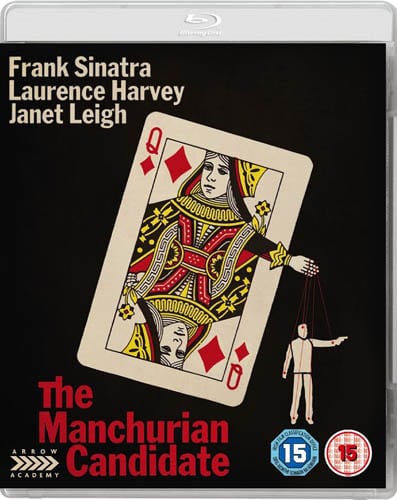
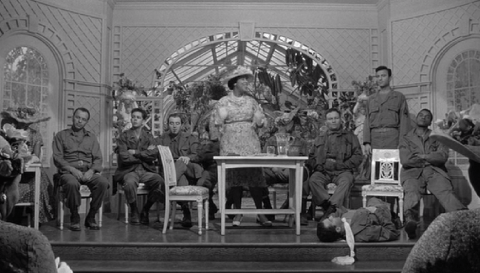
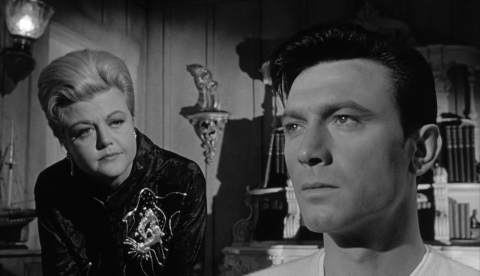



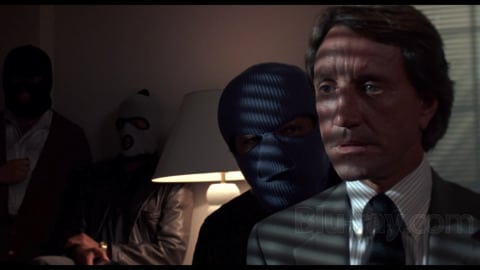
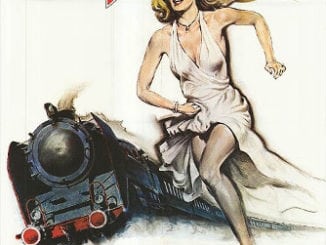
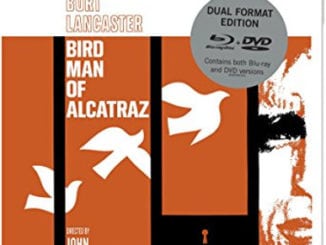
Be the first to comment